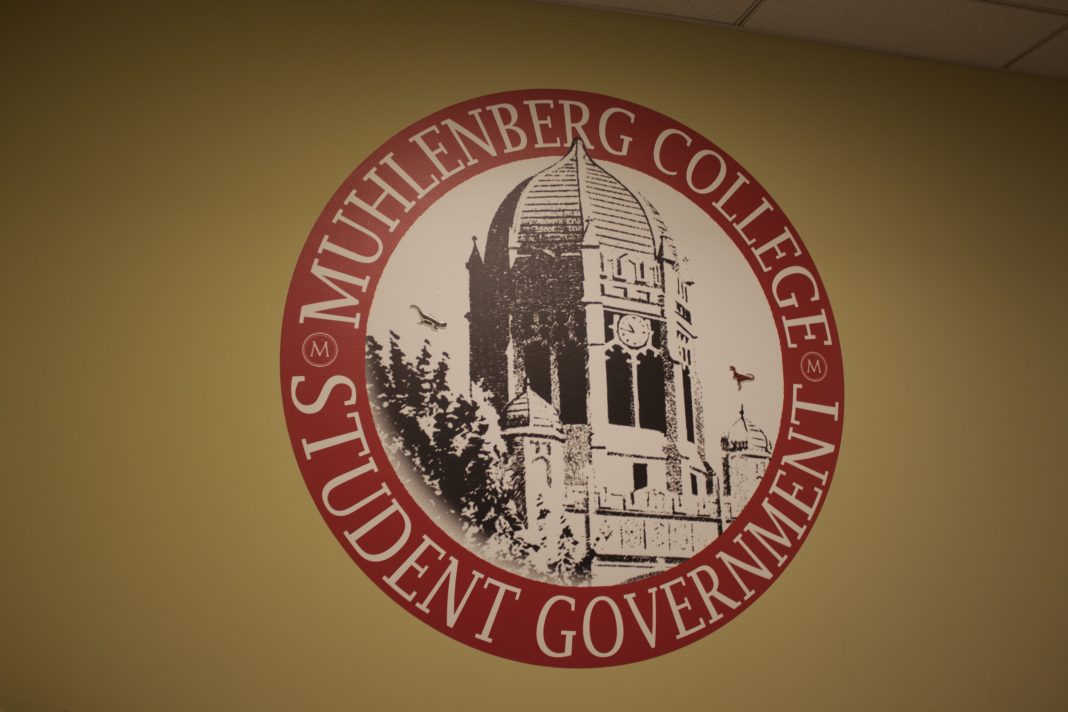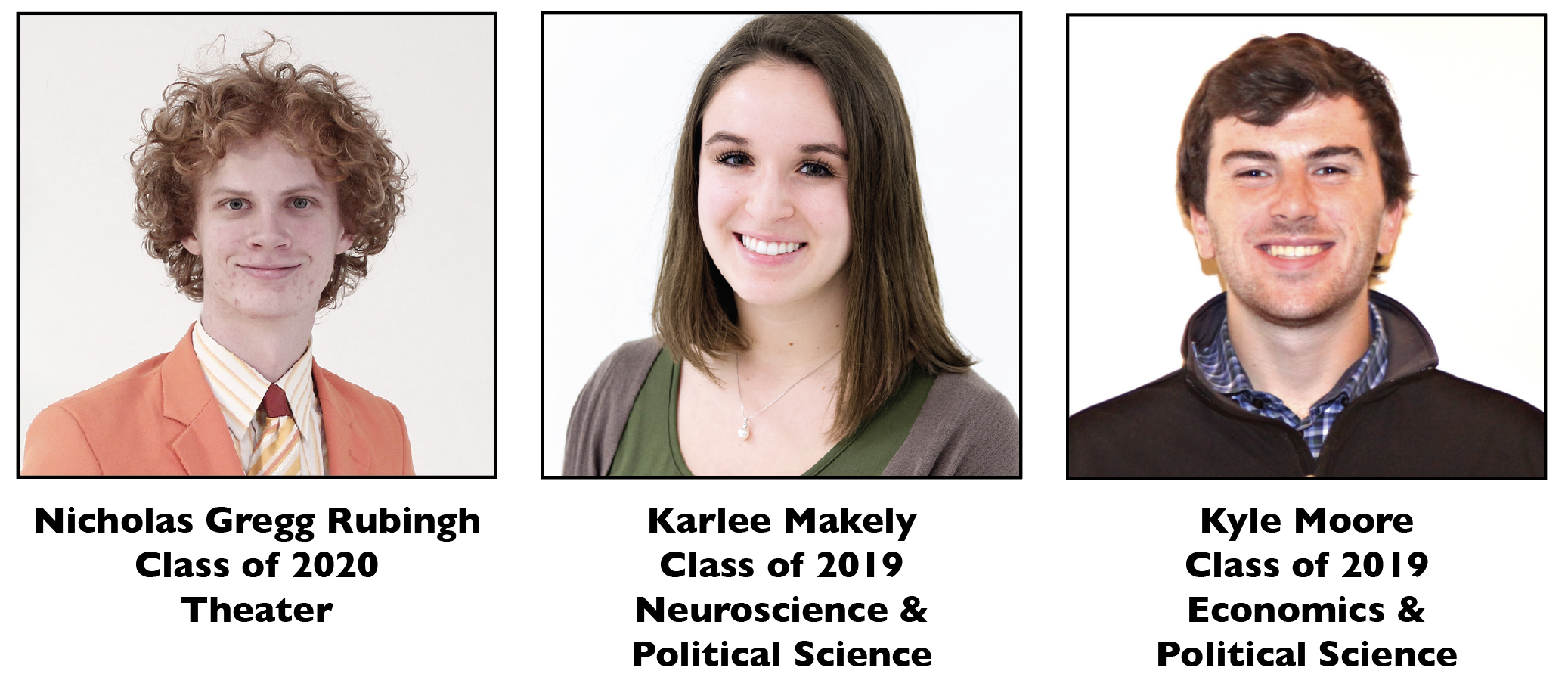All members of SGA serve on internal committees and vote at general assembly meetings, often with respect to student organizations’ budgets. SGA meetings are held weekly at 5:30 p.m. in the Seegers Union Great Room.
On Tuesday, Nov. 14, Muhlenberg students will have the opportunity to vote for 22 representatives and a new president to represent them on the Student Government Association (SGA).
The candidates for president are David Berg ‘19, Karlee Makely ‘19, Kyle Moore ‘19 and Nicholas Gregg Rubingh ‘20. You can read our interviews with Makely, Moore and Rubingh below (Berg did not respond to our interview request). You can also read our Editorial Board’s presidential endorsement here and cast your vote here.
The Muhlenberg Weekly: All of the candidates are well qualified, so what can you offer as SGA president that distinguishes you from other candidates?
Makely: Makely sees the College as somewhat “cliquey” and feels that her extracurricular interests position her “to benefit all different groups of students at Muhlenberg.”
Moore: Moore has participated in SGA becoming an “account able representative of the student body” over the last year. Moore says he can build upon that record and help SGA serve as a facilitating body with College administrators for student concerns, given his background with Delta Tau Delta and ultimate frisbee.
Rubingh: Rubingh says that he has been successful in soliciting opinions and connecting students to resources that SGA offers. He also feels that he “can surf the waters of bureaucracy” to complete projects more efficiently.
MW: What have you achieved thus far with SGA that qualifies you to serve as its next president?
Makely: Makely said that she has served on SGA since the beginning of her freshman year and has worked closely with the current SGA president, Emily Morton ‘18, on a variety of different initiatives focusing on improving SGA transparency. “I believe we have the best relationship with College administration and students do not necessarily utilize that to its full potential,” said Makely.
Moore: Moore has served on the Finance Committee, which successfully fought to eliminate the Class V designation, meaning that club sports can now request SGA funding. Moore says he has also served on the committees that established the new tank-top policy in the Life Sports Center.
Rubingh: Rubingh has worked to improve technology in the GQ lounge and initiated the process of improving payment options for laundry on campus. Rubingh also serves on a college committee that reviews academic petitions where he has successfully collaborated with faculty members to standardize the evaluation process for petitions.
MW: Discuss one specific improvement to our campus you would set out to complete as SGA president. What is it, why is it important, and how would you achieve this goal?
Makely: Makely believes that SGA should first strive to get students more involved and knowledgeable about the General Assembly’s capacities before identifying concrete things to change.
Moore: Moore sees the lack of activities at night, both during the week and weekend, as a “pressing need” that SGA can address. He sees SGA as uniquely able to deliver these experiences, especially for underclassmen who may not be involved in as many clubs and organizations.
Rubingh: Rubingh says that poor communication between the administration and students is both its own issue, as well as one that exacerbates others on campus. As an example, Rubingh says that insufficiently qualified or unenthusiastic SGA members serve on College committees because often, the committees do not know how to identify other, non-SGA affiliated students; Rubingh believes SGA is an essential piece in assisting with this process.
MW: A common refrain in general assembly meetings is striving to improve transparency and communication with students and student organizations. How would you rate SGA’s transparency and communication, and as SGA president, what concrete efforts would you take to improve them?
Makely: Makely notes SGA has moved its meetings from Haas to Seegers to be more approachable and see campus-wide events as a way to increase transparency. Makely says that SGA’s Diversity and Inclusion committee is “under-utilized” and she plans to make it more influential and useful.
Moore: Moore believes that SGA does not participate in enough public outreach events and does not sufficiently publicize their meetings and office hours. “Our main priority should be to ensure that all students know what SGA is and how we can help,” said Moore.
Rubingh: Rubingh says that currently, SGA treats transparency as a “passive process,” in that their meetings are available and meeting minutes are posted online. Rubingh wants SGA to be “actively transparent” through advertising meetings, better utilizing social media and sending out periodic emails with short SGA updates and requests.
MW: What does SGA currently do to support marginalized students on campus? What would you do to improve this?
Makely: Makely says that multicultural clubs and organizations come to SGA for funding, so while SGA knows what events and activities are being hosted, these groups do not necessarily know what other types of support SGA can offer. She proposes regularly scheduled meetings with the Diversity and Inclusion Committee to facilitate these conversations.
Moore: Moore criticized the administration’s inaction following recent events like the Bear Security incident in September and the Alternative Center for Ethics posters that were posted after Janaya Khan’s speech last month. “SGA needs to do a better job holding the administration accountable and pressure them for real change,” said Moore.
Rubingh: Rubingh says that although SGA recently formed a Diversity and Inclusion Committee, he is frustrated because it has yet to meet. “SGA needs to actively meet with these communities and identify what their needs and concerns are, and then connect them to resources that we offer,” said Rubingh.
MW: Why do you want to be SGA president?
Makely: Makely feels that Muhlenberg is her second home and she hopes to leverage her position as SGA president to ensure others have the opportunity to feel the same way. “Muhlenberg is an inspiring place and I believe that if you feel comfortable at your college, you will have more chances to be successful,” said Makely.
Moore: Moore says that he is tired of SGA only having conversations and feels that if elected, he is best positioned to translate that talk into action. “SGA has been trudging in the mud for the last couple of years. The main reason I want to be president is because I want to get stuff done,” said Moore.
Rubingh: Rubingh says that he has demonstrated to himself and others that he can address concerns with concrete solutions. “I believe I can bring dedication, energy and creativity to the presidency, and those are important qualities for any leader,” said Rubingh.
Gregory Kantor served as the Editor-in-Chief from 2016 -2018 and majored in Public Health with a minor in Jewish Studies. In addition to his work with The Weekly, Greg served on Muhlenberg College EMS and worked in the Writing Center. A native Long Islander, he enjoys watching New York's losing teams – the Mets, Jets, and Islanders – in his free time.























